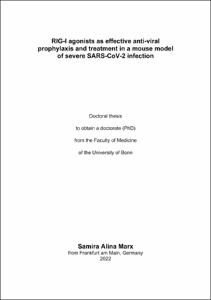Marx, Samira Alina: RIG-I agonists as effective anti-viral prophylaxis and treatment in a mouse model of severe SARS-CoV-2 infection. - Bonn, 2022. - Dissertation, Rheinische Friedrich-Wilhelms-Universität Bonn.
Online-Ausgabe in bonndoc: https://nbn-resolving.org/urn:nbn:de:hbz:5-67229
Online-Ausgabe in bonndoc: https://nbn-resolving.org/urn:nbn:de:hbz:5-67229
@phdthesis{handle:20.500.11811/10025,
urn: https://nbn-resolving.org/urn:nbn:de:hbz:5-67229,
author = {{Samira Alina Marx}},
title = {RIG-I agonists as effective anti-viral prophylaxis and treatment in a mouse model of severe SARS-CoV-2 infection},
school = {Rheinische Friedrich-Wilhelms-Universität Bonn},
year = 2022,
month = jul,
note = {The recent outbreak of the COVID-19 pandemic highlights the need for novel prophylactic and therapeutic countermeasures against newly emerging viruses. Innate immune receptor agonists are considered to be a promising new approach to provide potent anti-viral protection. Activation of the cytosolic nucleic acid sensor RIG-I by selective short 5’ triphosphate dsRNA resulted in the induction of pro-inflammatory cytokines and type I interferons, in the establishment of immediate antiviral resistance on a single-cell level in the lungs, and shaped both innate and adaptive immunity through the recruitment and activation of immune cells. While RIG-I agonists mediate strong anti-viral protection against Influenza A infections in mouse models, their potency has not been yet investigated in conferring protection against SARS-CoV-2. In vitro, the prophylactic treatment with RIG-I agonists inhibited SARS-CoV-2 viral replication and induced sustained expression of interferons and proinflammatory cytokines more potently than treatment with recombinant IFNα. Moreover, the effectiveness of RIG-I agonists against SARS-CoV-2 was tested in vivo in a mouse model of severe SARS CoV 2 infection. A single prophylactic systemic administration of RIG-I agonist, but not recombinant IFNα, potently inhibited viral replication in the upper respiratory tract, lungs and brain and reduced local inflammation in the lungs. Furthermore, the single prophylactic treatment up to seven days prior to the infection conferred intermediate levels of protection from lethality, with the best protection being achieved when given one day prior to infection. Survival was associated with cleared viral infection in the lungs and brain and the generation of high titers of neutralizing IgG antibodies against SARS-CoV-2. In addition, repeated systemic therapeutic RIG-I agonist treatment also led to the partial protection against COVID-19 associated mortality and significantly suppressed viral replication in the lungs during the active course of infection. Collectively, this study provides new preclinical evidence that RIG-I agonists may serve as a new broadly-active and effective anti-viral treatment option against emerging and re-emerging viral infections in the future by the potent induction of innate immunity.},
url = {https://hdl.handle.net/20.500.11811/10025}
}
urn: https://nbn-resolving.org/urn:nbn:de:hbz:5-67229,
author = {{Samira Alina Marx}},
title = {RIG-I agonists as effective anti-viral prophylaxis and treatment in a mouse model of severe SARS-CoV-2 infection},
school = {Rheinische Friedrich-Wilhelms-Universität Bonn},
year = 2022,
month = jul,
note = {The recent outbreak of the COVID-19 pandemic highlights the need for novel prophylactic and therapeutic countermeasures against newly emerging viruses. Innate immune receptor agonists are considered to be a promising new approach to provide potent anti-viral protection. Activation of the cytosolic nucleic acid sensor RIG-I by selective short 5’ triphosphate dsRNA resulted in the induction of pro-inflammatory cytokines and type I interferons, in the establishment of immediate antiviral resistance on a single-cell level in the lungs, and shaped both innate and adaptive immunity through the recruitment and activation of immune cells. While RIG-I agonists mediate strong anti-viral protection against Influenza A infections in mouse models, their potency has not been yet investigated in conferring protection against SARS-CoV-2. In vitro, the prophylactic treatment with RIG-I agonists inhibited SARS-CoV-2 viral replication and induced sustained expression of interferons and proinflammatory cytokines more potently than treatment with recombinant IFNα. Moreover, the effectiveness of RIG-I agonists against SARS-CoV-2 was tested in vivo in a mouse model of severe SARS CoV 2 infection. A single prophylactic systemic administration of RIG-I agonist, but not recombinant IFNα, potently inhibited viral replication in the upper respiratory tract, lungs and brain and reduced local inflammation in the lungs. Furthermore, the single prophylactic treatment up to seven days prior to the infection conferred intermediate levels of protection from lethality, with the best protection being achieved when given one day prior to infection. Survival was associated with cleared viral infection in the lungs and brain and the generation of high titers of neutralizing IgG antibodies against SARS-CoV-2. In addition, repeated systemic therapeutic RIG-I agonist treatment also led to the partial protection against COVID-19 associated mortality and significantly suppressed viral replication in the lungs during the active course of infection. Collectively, this study provides new preclinical evidence that RIG-I agonists may serve as a new broadly-active and effective anti-viral treatment option against emerging and re-emerging viral infections in the future by the potent induction of innate immunity.},
url = {https://hdl.handle.net/20.500.11811/10025}
}






